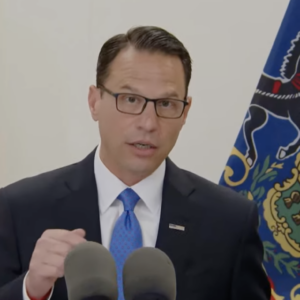Hold on to your wallet.
The Commonwealth Foundation has come out with another critique of Gov. Josh Shapiro’s proposed $48.3 billion 2024 budget. The organization says it will lead to a $2,000 tax increase for a family of four after state surpluses are drained.
Officials at the state’s free-market think tank say, if passed, this budget would expand Pennsylvania’s structural deficit to more than $6 billion by 2028. And that would bring significant tax increases, according to its research.
The budget includes $4.5 billion in new spending initiatives. It would take the surplus from $7 billion to less than $4 billion, a structural deficit of more than $4 billion for revenue versus spending, a think tank spokesman said. The structural deficit would drain the fund balance, eventually requiring a tax increase.
Shapiro would use the state’s general fund balance and then move on to the $7 billion Rainy Day Fund. However, state law says Pennsylvania’s Rainy Day Fund reserves “shall not be used to begin new programs but to provide for the continuation of vital public programs in danger of being eliminated or severely reduced due to financial problems resulting from the economy.”
Commonwealth officials said that Shapiro’s budget flouts this statute.
“Gov. Shapiro’s deficit projections seem deliberately misleading,” said Commonwealth Foundation Senior Vice President Nathan Benefield. “Pennsylvania has lost nearly 65,000 residents to other states over the last two years—working adults are leaving the commonwealth. Yet, the Shapiro administration believes the economy will surge and state revenues will exceed the IFO’s calculations by more than $850 million in fiscal years 2024–25 and 2025–26. The governor’s math doesn’t add up.”
Shapiro’s budget projections also put a rosy spin on revenue growth while underestimating spending increases. But the Pennsylvania Independent Fiscal Office (IFO) calculations paint a different picture.
Rep. Seth Grove (R-York), who chairs the House Appropriations Committee, noted the surplus and Rainy Day Fund boost the state’s bond rating; if those are depleted, the bond rating would fall, increasing the cost of borrowing. The state would need to borrow from other entities to pay its obligations, whereas now it borrows from the Treasury. The current Rainy Day Fund is saving taxpayers $100 million in long-term debt costs, Grove said.
Reacting to the governor’s budget estimates, state Sen. Jarrett Colemen (R-Breiningsville) said, “The legislature should absolutely use the IFO’s revenue projections when determining what funds will be available. What’s more concerning is that even with the overly optimistic revenue projections offered by the governor, his spending levels would drain the Rainy Day Fund and all other reserves by the middle of 2027. Spending at that pace is completely irresponsible.”
Despite the governor’s promises, Shapiro’s budget outlook projects no increases in basic education funding after fiscal year 2024–25. This means the budget deficit will be about $4 billion higher than his forecast, Commonwealth officials claim.
Manuel Bonder, a spokesman for the governor, defended Shapiro’s budget and disparaged the Commonwealth Foundation.
“Gov. Shapiro is focused on getting things done and creating opportunity for Pennsylvania families – not on poorly written press releases from special interest groups,” said Bonder.
“Gov. Shapiro doesn’t believe it should be a badge of honor for politicians to tax Pennsylvanians more than needed, just for over $14 billion to sit in a bank account in Harrisburg — the situation we find ourselves in now. The facts are clear: the governor’s budget is balanced, cuts taxes – doesn’t raise them – and even if every single thing in this proposal were enacted, we would still have an $11 billion surplus at the end of the day,” Bonder said.
Benefield disagreed.
“Pennsylvanians can’t afford the thousands more in taxes that Shapiro’s budget would heft upon them,” said Benefield. “Nor can they afford an administration that uses creative accounting to mask the true cost of the governor’s spending proposals. Our families deserve better than runaway government spending, increased deficits, depleted reserves, and tax hikes on working families.”
View the Commonwealth Foundation’s fact sheet here.

